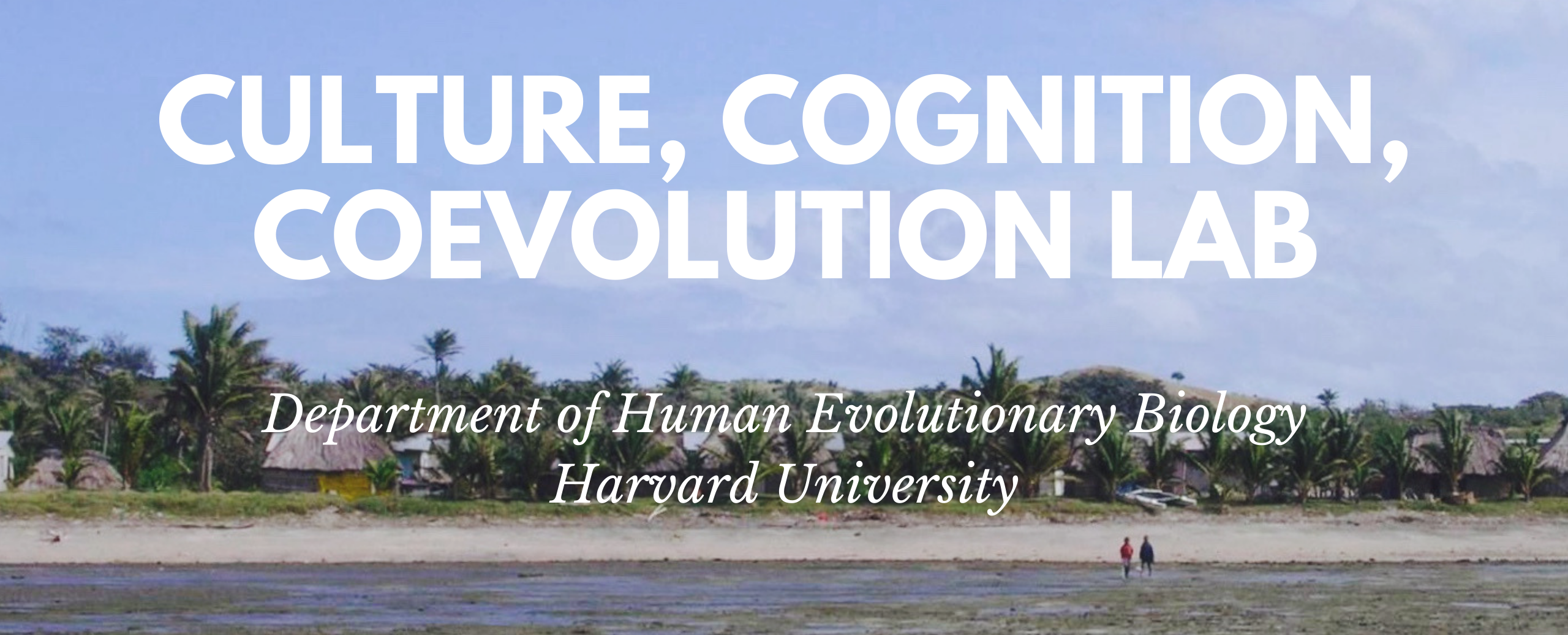Unpaid Internships in the Culture, Cognition, and Coevolution Laboratory
The Culture, Cognition, and Coevolution Laboratory welcomes inquiries from undergraduate students and recent graduates interested in completing mentored research projects as unpaid interns. During their time in the lab, interns will learn about cutting-edge research in cultural evolution and, as appropriate for specific projects, advanced quantitative methods such as causal inference, game theory, and natural language processing. Unpaid internships will involve the following opportunities:
-
Close collaboration with a more senior member of the lab on a long-term research project;
-
Participation in lab meetings and journal clubs, including regular opportunities to present work in progress;
-
Attendance at departmental seminars and colloquia;
-
Mentoring, career counseling and guidance about applying to graduate school.
Students who make substantial contributions to research may also receive letters of recommendation for future opportunities and be co-authors on peer-reviewed publications.
Internships may be in-person or virtual. Please note that because of administrative barriers, for now, we can only provide RA opportunities to Harvard students (except for the Anansi Story Project, which is open to RAs from any institution).
Interested individuals should contact Mona Xue (culture.cognition.evo.lab@gmail.com) with a copy of their CV and a brief statement about projects of interest. Current projects with immediate openings for interns are listed below. Aside from these projects, students are also welcome to inquire about other ongoing research in the lab or to suggest ideas that might be of mutual interest.
Current Projects
Anansi Story Project (Manvir Singh and TC Zeng)
Anansi seeks to create a database consisting of more than 1,600 legends, folktales, and myths from around the world. Members of the project team will read these stories and answer questionnaires about content, narrative structure, and individual characters, while also exploring computational approaches to story annotation.
Systematic Review of Linguistic Fairness in Medicine and Public Health (Damián Blasi and Joseph Dexter)
Text-based methods and metrics are central to many areas of life, from marketing and social media curation to medical diagnosis. A common feature of language-based assessments across domains is the central position of English - with few exceptions, methods tend to be developed with English-language corpora in mind and then adapted hastily (if at all) to other languages and cultural contexts. For clinical and public health applications, such linguistic unfairness can have serious adverse consequences for health equity and can complicate studies of the influence of culture on psychological well being, but the scope of the problem remains poorly defined. Members of the project team will conduct a systematic review of language-based assessments in medicine, giving particular attention to the prevalence for English-only methods and, for multilingual approaches, the quality of validation data available for the other languages included. This work will culminate in the joint preparation of a short review article, to be submitted to a medical journal.
Embodied cognition and emotion concepts in historical contexts (Jennifer Devereaux)
Experience with Python, Word2vec, and data visualization (UMAP, PaCMAP) are required. The RA will collaborate with an MBB Fellow who is also a linguist and historian. They will occasionally be asked to take on a training role. The weekly commitment for this position is approximately 3-5 hours per week.
Quantifying Perceptions of Genre (Joseph Dexter)
Genre - for instance, whether a text is poetry or prose, or, more specifically, a novel, biography, or political speech - is a central organizing principle in the study of literature: many students take courses on, say, 19th century British novels or early modern drama. When given the frequencies of common words or various stylistic markers for a set of texts, computers do very well at identifying genre. Accuracies in excess of 95% are not unusual, and this strong performance underlies a lot of interesting research in the digital humanities and computational social sciences. Yet little is known about human performance on the same task (especially for cross-cultural samples). Taking inspiration from a recent study of music in which participants successfully identified the social function of unfamiliar songs just by listening to short clips (Mehr et al. 2018), the project team will investigate the perceptual basis for distinguishing literary genres. Study participants will read short passages of English literature with all formatting cues removed and answer questions about the genre of each passage and the stylistic features that most informed their guesses.
